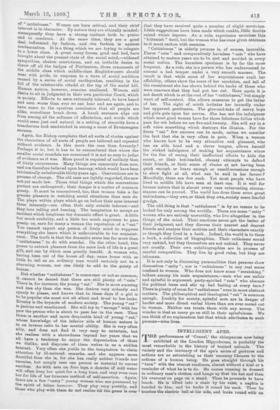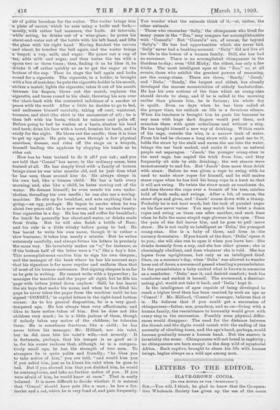INTELLIGENT APES.
THE performance of 'Consul,' the chimpanzee now being exhibited at the London Hippodrome, is probably the most remarkable in the history of trained animals. The variety and the intricacy of the ape's series of gestures and actions are as astonishing as their uncanny likeness to the actions of a human being. He goes straight through his "turn" with the utmost readiness, almost without a hint or reminder of what he is to do. He comes running in dressed in ordinary man's clothes, and hangs up first his bat and then his overcoat on pegs on a stand. Then he proceeds to have lunch. He is lifted into a chair by his valet, a napkin is handed to him, and he tucks it round his neck. Then he touches the electric bell at his side, and looks round with an
• air of polite boredom for the waiter. The waiter brings him plate of •carrot;which he eats using a knife and •fork,— ' mostly, with rather bad manners, the knife. At intervals, ' While' eating, he drinks out of a' wine-glass; he pours his • claret-and-water out of the bottle with his left hand, and lifts the glass with his right band: ' Having finished the carrots and 'claret, be touches the bell agaiiVand the waiter brings 'a teapot; a cup, milk, and sugar. He pours out a cup of 'tea,' adds milk' and ' sugar, and then tables the tea with a • sPOon two or three times ; then, finding it as he likes it, he ' drinks it off rather 'quickly so as tO get the sugar at the bottom of the cup. Then he ringe• the bell again and looks round for a cigarette. The cigarette, in a holder, is brought With a box of matches; he puts the cigarette-holder in his mouth, • 'strikes a match, lights the cigarette; takes it out of his mouth 'between his fingers, ' blows out the match, replaces the ' cigarette, and turns round in his chair, throwing his arm over • the 'Chair-back with the contented indolencenf a smOker at 'peace with the world. After a little he decides to go to bed, 'and' undresses himself carefully, taking off Coat, waistcoat, 'trousers, and shirt (the shirt is the uncannieet of all) ; he is 'then left with his boots, which he unlaces and pulls off. Before going to bed he washes at a basin, slushea his head ' and'heeK' dries his face with a towel, brushes his teeth, and is 'ready' for the night. He blows out the candle; then it is time 'to get up again. He gets up, goes through a few physical exercises, dresses, and rides off the stage on a tricycle, himself leading the applause by clapping his hands as he rides out.
How has he been trained to do it all P you ask ; and you are told that 'Consul' has never, in the ordinary sense, been trained at all. He has simply lived with • a family of human beings since he was nine Months old, and be just does what 'be has seen those around him de. He always sleeps in his own bed, like a human 'child. He has a bath every
• morning, and, also like a Child, he hates coining out of the water. He dresses himself; be even mends his own under. clothes, threading his own needle ; he can also use a sewing- machine. He sits up for breakfast, and eats anything that is 'going,—an egg,•perhaps. He began to smoke when he was about two years old ; he is now seven, and lie smokes twenty- ' four cigarettes in a day. He has tea and coffee for breakfast; ' for lunch' he generally has claret-and-water, or drinks made 'froth: •thlits. Bat be will also finish a bottle of Bass; and his rule is ' a little whisky before going to bed. He has ' learnt to write his own name, though it is rather a 'slow business; it takes him nearly a minute. • But he writes 'eitrernely carefully, and always foi•ms his letters in precisely Vie same way. Ile 'invariably makes an 'o," for , instance, as if the bottom .half of the letter Were a "v," like a boy's kite. This accomplishment enables him to sign his own cheques ; 'and the manager of the bank where be has his account says that his Signature is far more regular and uniform than that
most of his 'human customers. B•ut signing cheques is as far ' as he' gets in writing. He cannot write with a typewriter; he 'manages the 'Machine and the paper all right, but he fills his `page with letters jotted down anyhow. Still, be has learnt the six keys that make his name,' and when he has filled his • page be never tithes the paper from the machine until he has signed 'CONSUL ' in capital letters in the right-hand bottom • corner. As to his general disposition, be is a very good-
• tempered ape. He has always been very affectionate, and likes to have notice taken of him,. But he does not like children very much ;* be is a little jealous of them, though
if nobody takes any notice of the children; he tolerates them. He is sometimes fractious, like a child; he has • never bitten hie manager, Mr. Hilliard, nor his valet, .bat be did once bite his •valet's • wife,—not severely. • It is fortunate, 'perhaps, that his temper is as • good as it is, ler his owner reckons that, although • be is • a compare- lively small • ape, be has the strength of two men. • To strangers he is quite polite and friendly; "he likes you to take notice' of him," you are told, 'and would kiss you if you asked him, just as be kisses his valet when he goes to 'bed. But if you showed him that you disliked him, he would be contemptuous, and take no further notice of you. If you
were afraid of him,, he would know at once." That is .easily , believed. It is more difficult to decide whether it is natural that 'Consul' should have pets like a man ; he has a fox- ''terrier and a cat; which he is very fond of, and pats frequently.
You wonder what the animals think of it,—or, rather, the other animals.
, Those who remember 'Sally,' the chimpanzee who lived for many years in the "Zoo," may compare her accomplishments with But 'Consul's' are, of course, far beyond ' Sally's."' • He has had opportunities which she never had. 'Sally' never bad a banking-account. 'Sally' did not live all her life in the bosom of a human family. Still, she has had no successor. There is no accomplished chimpanzee in the Gardens to-day; even Old Micky,' the eldest, has only a few tricks. The most intelligent apes at the "Zoo," or, at all events, those who exhibit the greatest powers of reasoning, are the orang-utans. There are three, Sandy," jaisob,' and Delia." Sandy,' the largest and oldest, has already developed the morose eccentricities of elderly bachelordom. He had his own notions of the time which an orang-utan should devote to sleep, and if he is called in the morning earlier than pleases him, he is furious; his whole day is spoilt. Even on days when he has been called at the proper time, his outlook on life is a ferocious silence. When his luncheon is brought him he peels his bananas 'as any man with huge dark fingers would peel them, and munches them with quiet orderliness and without a step. He has taught himself a new way of drinking. Within reach of his cage, outside the wire, is a narrow tank of water. From his bed he chooses a long 'straw with a good ear to it, holds the straw by the stalk and waves the ear into the water, brings the ear back soaked, and sucks it much as natural people eat asparagus. 'Jacob,' the younger orang-utan in the next cage, has copied the trick from him, and they frequently sit side by side drinking; the wet straws wave monotonously to and fro. , But 'Jacob ' doea more than drink with straw. Before he was given a rope to swing with be used to make straw ropes for himself, and he still makes straw ropes when he has tied his hemp rope in a knot so that it will not swing. He twists the straw much as coachmen do, and then throws the rope over a branch of his tree, catches hold of both ends, and swings. After a bit, of course, the straw slips and gives, and 'Jacob' comes down with a thump. Probably he is not hurt much, but the look of puzzled anger on his face never varies. You may watch him twist a dozen ropes and swing on them one after another, and each time when he falls the 'same stupid rage glowers in his eyes. , Then the pain of the fall leaves him, and he goes to pull more straw. He is not really so intelligent as 'Delia,' the youngest orang-utan. She is a , baby of three, and lives in the nursery downstairs. If you knock at the door, 'Delia' opens it to you; she wilt also run to open it when you leave her. She drinks decently from a cup, and she has other graces ; she is charmingly obedient, and does whatever she is told. She has lapses from uprightness, but only as an intelligent thief. Once, on a summer's day, when Delia' was allowed to wander loose out of doors, a nursemaid passed wheeling a perambulator. In the perambulator a baby sucked what is known in nurseries as a comforter. 'Delia' saw it, and desired comfort; took the comforter and sucked it herself. The nursemaid, a discrimi- nating girl, would not take it back, and ' Delia ' kept it.
Is the intelligence of apes capable of being developed to reach a higher level than has been reached by such an ape as 'Consul' P Mr. Hilliard, 'Consul's' manager, believes that it is. He believes that if you could' get a succession of chimpanzees—father, son, grandson, and so on—living with a humanfamily, the resemblance to humanity would grow with every' step in the succession. Possibly even physical differ- ences would disappear. The need for the distance between the thumb and the digits would vanish with- the ending of the necessity of climbing trees, and the ape's hand, perhaps, would become gradually nearer. a 'human hand. ,. But the answer is invariably the same. •Chimpanzees will not breed in captivity ; no chimpanzees are born except in the deep wild of equatorial Africa. Each captive, brought to share his life with human beings, begins always as .wild ape among men.







































 Previous page
Previous page